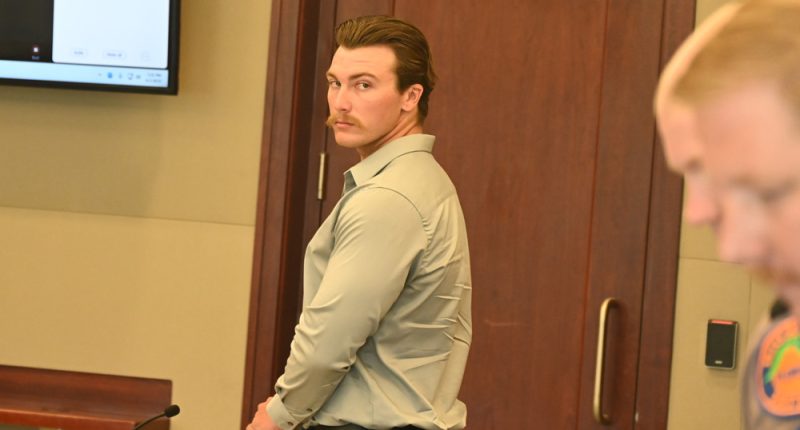
Jayden Jackson, the 23-year-old resident of Daytona North facing a first-degree felony hit-and-run charge in the death of Shaunta Cain, 54, on U.S. 1 almost three years ago, was sentenced to five years in state prison followed by five years on probation, plus restitution and other requirements.
Jackson is the son of Brian Jackson, a long-time deputy with the Flagler County Sheriff’s Office.
The crash took place after 4 a.m. on November 26, 2022, near Plantation Bay, the large development near the Flagler-Volusia county line. Jackson was driving back to Flagler County with a friend after a night out in Daytona Beach.
Assistant State Attorney Jason Lewis argued to Circuit Judge Dawn Nichols that Jackson was impaired at the time of the crash and should serve prison time. The minimum mandatory time under state guidelines is four years in prison. Lewis said Jackson’s driving pattern “clearly” showed impairment.
“The fact that he doesn’t remain at the scene, he shouldn’t be rewarded,” he said. Leaving the scene enabled him to evade blood tests and FHP’s gathering of evidence that would have likely resulted in a DUI manslaughter charge, Lewis said, and a minimum mandatory prison sentence of 10 years. “He fled that scene,” Lewis said, and lied about what he struck.
“He’s continuing to lie to cover up his tracks,” Lewis said. “This is someone who basically left her there like a piece of trash.” As far as the state is concerned, Jackson has shown no remorse, Lewis said, asking for six to seven years in prison, followed by probation.
Jackson’s attorney, Josh Davis, argued that Jackson was not charged with drunk driving, and no evidence established that he had been drunk at the time of the collision. Davis argued for a youthful offender sentence, rather than sentencing Jackson as an adult. He questioned what he called the “conjecture” about whether he was impaired, and seemed to equivocate as to where Cain was struck, prompting the judge to assert to him sternly: “Mr. Jackson had to go off road” to hit the victim.
The judge was also skeptical about Davis’s argument that he was not impaired, since his fleeing from the scene closed the door on gathering that evidence, with “at least” a 12-hour delay between the crash and the report of Jackson’s involvement in the crash, by which time the alcohol would be out of his system, the judge said.
“The one problem that he did, the one law that he broke, was not calling after that crash. He was not at fault for the crash,” Davis said.
“He was not charged to be at fault for the crash. It was not charged. I’ll leave it at that,” the judge said.
Davis almost blamed the victim, saying she was wearing dark clothes on a pitch-black night, and that Jackson made one mistake.
The crash took place a little after 4 a.m., according to the Florida Highway Patrol. Cain was not walking in the roadway. A passer-by reported it at dawn or near daylight. It was never exactly clear when Jackson’s father informed law enforcement about the crash.
The state called Brian Jackson to the stand to establish that. Brian was in Miami for the funeral of an FBI agent (former Palm Coast Mayor David Alfin’s son, who’d been killed with his partner while serving a warrant). On the stand, Brian did not recall when his son called him to inform him of the crash, or whether it was light or dark out. Initially he believed his son, that he’d hit a deer, but not after a colleague studied the picture his son had sent his father and told him the damage was not consistent with a collision with a strike.
It was later in the afternoon as he was returning to Flagler County that he called a supervisor at the Sheriff’s Office to let him know his son may have been involved in the crash.
Lewis questioned Cpl. Dennis Sheffield, the Florida Highway Patrol traffic homicide investigator who responded to the U.S. 1 scene. (He’s been a THI investigator for five years of a 12-year career with FHP, completing “a couple of hundred” death investigations.) Sheffield noted the tire marks and furrows that indicated the vehicle veered into the U.S. 1 median, veered out, then back into the grass. The collision catapulted Cain several feet into the median, leaving one of her shoes behind: it’s “very common,” Sheffield testified, that pedestrian crash victims are knocked out of their shoes by the force of the collision.
Lewis also questioned FHP’s Cpl. Clayton Visman, the lead traffic homicide investigator.
Visman had interviewed Brian Jackson, whose truck Jayden was driving. Brian was in South Florida at the time of the crash. He had not given permission to his son to use the truck. Jayden had told him he’d struck a deer, but also told him he’d struck a car.
Jackson had a passenger, Joseph K. his “good friend,” Visman said. Visman interviewed Joseph at the State Attorney’s Office with Lewis present.
Based on Joseph’s account, Jackson and Joseph went to Razzle’s nightclub in Daytona Beach, where Jayden had “three to five” drinks, according to Joseph. Joseph was not comfortable driving because he felt he was impaired, Visman said. The two stopped at Buc-ee’s on the way back, leaving that store around 3 a.m. and taking U.S. 1 at the exit just south of the Volusia-Flagler county line, heading north from there.
Joseph was on his phone when Jackson struck Cain. Joseph told him, “we need to stop. Jackson replied, “No, it’s OK, we don’t need to stop,” according to Visman even as Joseph asked him several times to stop. Jackson did eventually stop, but only to evaluate the damage.
“So Mr Jackson absolutely knew he hit a pedestrian,” Lewis asked the investigator.
“Yes, sir,” Visman said. Jackson told Joseph that everything would be OK. They drove on to Jackson’s home. Joseph stayed there rather than go back to his own house “because he’d been drinking,” Visman said. Jackson had decided to tell his father that he’d struck a deer. He did not call law enforcement.
The victim’s mother testified by zoom from South Carolina (after Davis asked for her identification). She “never met a stranger,” her mother said of Cain, who had been accepted at Spellman College in Atlanta and had continually educated herself. She was a “peacemaker who never raised her voice.” Jackson, she said, had left her daughter to die in the road “as if she didn’t matter.”
“To know her was to love her,” she said of her only daughter (she has three sons), going off her statement. “She never did anything to harm anybody.” Based on testimony she had just heard, the mother told the court, knowing that Jackson had hit a person, “my daughter, it could have been anybody else’s daughter,” she asked the judge to give Jackson “the highest, maximum prison time” allowed and suspend his license.
The mother had to pay a $4,890 bill for burial expenses. Davis asked the mother about a $10,000 insurance settlement. The mother said she’d not received any money from insurance. Lewis asked the court to require Jackson to pay restitution in addition to serving 120 community service hours at a trauma center or something similar, and to participate in a victim impact panel.
“I also want to tell deputy Jackson,” the judge said, addressing Brian Jackson in the gallery, “I’m sorry that your son got you into this mess and this quagmire, because there’s nothing more conflicting for a parent to want to protect their child, but also to honor their role in law enforcement. So I recognize what a very, very difficult position that your son put you in.”









